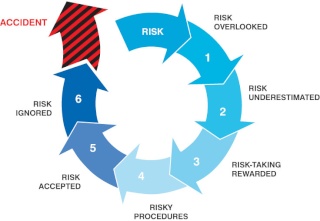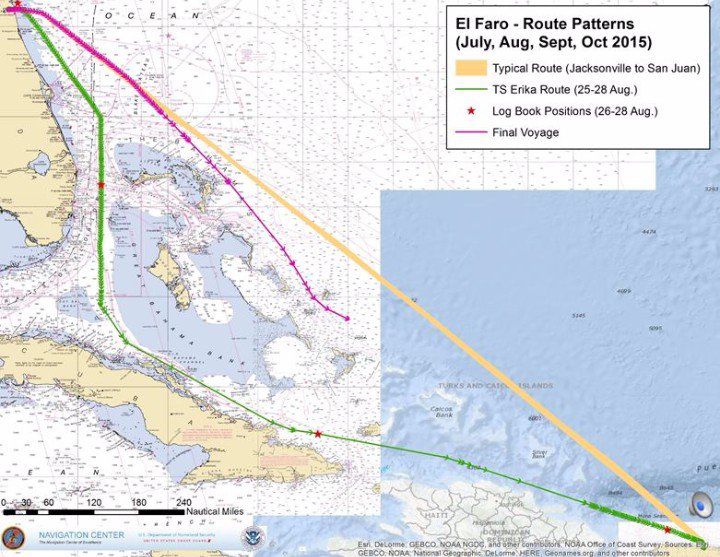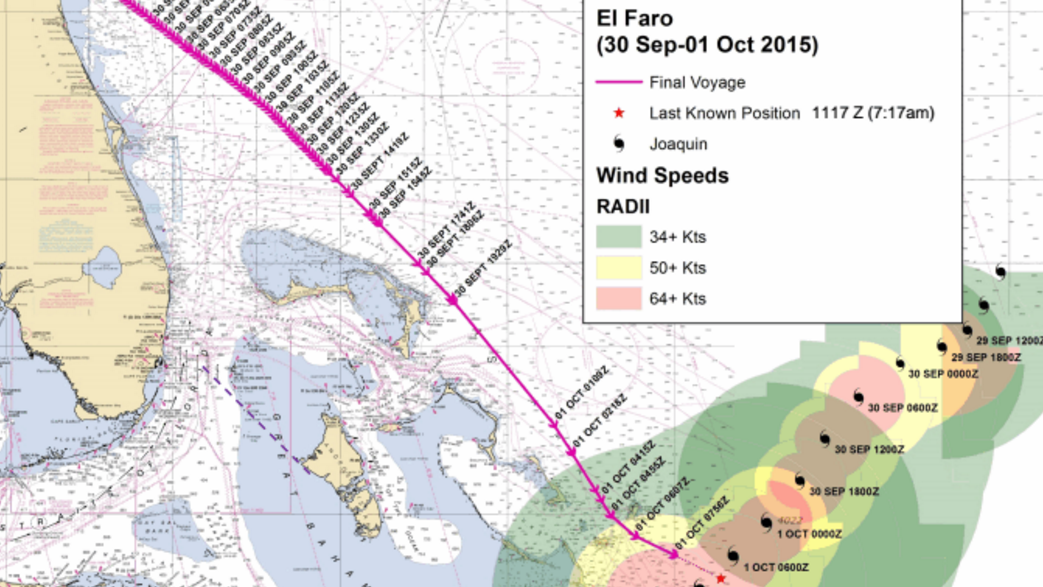Transcript of the three phone calls:
Audio 1: Voicemail left by Capt. Davidson to John Lawrence, designated person a shore
Captain Lawrence, Captain Davidson, Thursday morning 0700. We have a navigational incident. Umm,
I’ll keep it short. A, uh, scuttle popped open on 2 deck and we were having/had some free
communication of water go down the 3… 3-hold. Have/getting a pretty good list. I want to, uh, just
touch – contact you verbally here. Everybody’s safe, uh, yeah but I want to talk to you.
Audio 2: Call by Capt. Davison to the call center
Operator: Okay sir?
Capt. Davidson: Yup. Are you connecting me through to a QI?
Operator: That’s what I’m, uh, getting right now is seeing who is, uh, on call and I’m going to get your right to them; give me one second sir, I’m going to put you on a quick hold. So one moment please.
(<click> )
Operator: Okay, sir, I just need your name please. (Capt, Davidson is speaks inaudibly in the background)
Capt. Davidson: Yes, ma’am, my name is Michael Davidson, Michael C. Davidson.
Operator: Your rank?
Capt. Davidson: Ship’s master.
Operator: Okay thank you. Ship’s name?
Capt. Davidson: El Faro
Operator: Spell that E- L…
Capt. Davidson: Oh man, the cl – uh – the clock is ticking. Can I please speak with a QI? El Faro, Echo – Lima – Space – Foxtrot – Alpha – Romeo - Oscar, El Faro. What’s his position?
Operator: Okay in case I lose you, sir, what is your phone number please.
Capt. Davidson: Phone number 870-773-206-528.
Operator: Got it.
Capt. Davidson: That’s my globe and let me give you the mini M.
Operator: Yes
Capt. Davidson: You ready to copy?
Operator: Yes.
Capt. Davidson: 870-764-6672-72
Operator: Got it sir. Again I’m going to get you reached right now, one moment please.
And, uh, mate, what else to do you see down there? What else do you see?
(<click>)
Operator: I’m going to connect you now, okay. Hi, good morning, my name is Sherida. Just give me one moment I’m going to try to connect you now, okay. Mr. Davidson?
Capt. Davidson: Okay.
Operator: Okay, one moment please.
(<click>)
Operator: Hi, thank you for waiting.
Capt. Davidson: Oh God.
Operator: Just really briefly what is your – um, what is the problem you’re having?
Capt. Davidson: I have a marine emergency and I would like to speak to a QI. We had a – a - a hull breach. A scuttle blew open during a storm. We have water down in 3-hold with a heavy list. We’ve lost the main propulsion unit. The engineers cannot get it going. Can I speak with a QI please?
Operator: Yes, thank you so much, one moment.
Audio 3: Call between John Lawrence and U.S. Coast Guard in Miami
Capt. Lawrence: John Lawrence.
Coast Guard: Hey John this is Petty Officer Chancery I’m from, uh, the Coast Guard in Miami, Florida. How are you?
Capt. Lawrence: Yes, sir. Uhhhm.
Coast Guard: Hey I’m calling you back. You were listed as a POC for the El Faro.
Capt. Lawrence: That’s correct.
Coast Guard: Okay, do you have contact or direct communications with the vessel?
Capt. Lawrence: I did. They had called me; I was just actually trying to call them back, and I couldn’t, uh - the satellite is dropping the call. I can give you the phone number.
Coast Guard: Yeah give me the phone number for the vessel That’s fine.
Capt. Lawrence: Ok, the satellite number, uh, so you’d have to dial, 8 – uh - usually it’s like 011 first to get the, uh satellite
Coast Guard: Uh, huh, yeah, 011
Capt. Lawrence: Alright 870-773-
Coast Guard: 773
Capt. Lawrence: 206-
Coast Guard: 206
Capt. Lawrence: 528.
Coast Guard: 528. Okay, I’m going to repeat that back. 011-870-773-206-528.
Capt. Lawrence: That’s correct, that’s what they called me on. I - I tried calling them back a few minutes ago to see if they had had any contact with you guys yet.
Coast Guard: Mmm Hmm, They Have
Capt. Lawrence: Oh, they have; you ‘ve talked to…?
Coast Guard: We contacted the – they’ve contacted LANT Area.
Capt. Lawrence: Oh, yeah - yeah, they uh - RCC Norfolk. Yeah I talked to them and they said they were notifying you, and then they’re, uh, I guess you - can you tell me what the, uh, what the plans, what you planning on doing now? You going to – they said said you were going to contact the Bahamas, I guess?
Coast Guard: Well yes, sir. So – so here’s the deal and that depends. Umm - so right now, right now based off all the information that you’ve, uh, that you’ve provided me, uh, you know I’m not – I’m not in the distress phase currently, uh, because ----
Capt. Lawrence: Okay.
Coast Guard: …because they’re not at risk of sinking and uh, they have dewatered and they uh – I’m looking at - they are without power and engines, uh…
Capt. Lawrence: Correct.
Coast Guard: Are they – so are they able to anchor that boat right there?
Capt. Lawrence: Uh I don’t think, they’re 48 miles East of, uh, San Salvador, so I don’t think so.
Coast Guard: Yeah. Well – but the position that I’m looking at they should be able to anchor.
Capt. Lawrence: Oh really, okay.
Coast Guard: It’s not that deep, um, and there’s some small islands that they’re right near. So I’m trying to ---- I’m trying to pull this up.
Capt. Lawrence: Yeah, I haven’t - you’ve got a better – you’ve got a better map than me right now. I’m sorry your last name is - Chancellor?
Coast Guard: Yeah – yeah. Chancery – C – H – A – N – C – E – R - Y. Um and – and - and right now – yes - I am going to pass this information on to the Bahamas. And, uh - you know it – it - it just depends because this is a large motor vessel.
Capt. Lawrence: Correct.
Coast Guard: So generally – generally for these types of situations where – where there’s not like an emergency distress where we would need to, you know, go out there and remove people from the vessel or something like that.
Capt. Lawrence: Correct.
Coast Guard: Uh, if they are just disabled, um, then – then generally it would be up to the company to provide some type of tug assist or – or something else like that.
Capt. Lawrence: Okay – okay.
Coast Guard: and have you guys - have you - you know, do you guys have like commercial towing assistance or – or any type of – uh - salvage contracts in place already?
Capt. Lawrence: Yes. Yes we do. And I can contact them.
Coast Guard: I would say to contact them sooner rather than later, um –
Capt. Lawrence: Okay.
Coast Guard: Because – uh - you know, I’m going to obviously call the ship and – uh - try to get a better – you know - feel of what the situation is. But – from what was passed on to me right now we would be – we would generally go that route.
Capt. Lawrence: Okay, no that – that makes sense.
Coast Guard: And also you’re in the – you’re in the territorial seas of foreign countries as well. So I’m looking ----
Capt. Lawrence: Right.
Coast Guard: I’m looking at right now. And - your nearest – your nearest probably safe haven where they could pull in would beTurks and Caicos.
Capt. Lawrence: Okay.
Coast Guard: All right?
Capt. Lawrence: Okay.
Coast Guard: And I will give you a call back with updates. Are you going to be the point of contact – uh - through this case with me?
Capt. Lawrence: Yes.
Coast Guard: Okay. All right, great. Alright, I’m going to try to give the ship a call and get a better handle on what the situation is and what’s going on now. And, uh, if you hear from them just give me a call back.
Capt. Lawrence: Okay. And what’s your direct number?
Coast Guard: It’s 305.
Capt. Lawrence: Okay.
Coast Guard: 415
Capt Lawrence: Okay.
Coast Guard: 1600.
Capt. Lawrence: Okay, sir.
Coast Guard: Thank you.
Capt. Lawrence: Thank you.
Coast Guard: Bye.
Capt. Lawrence: Okay.



